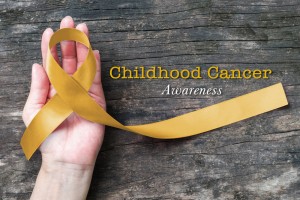Is there anything more terrifying than receiving a cancer diagnosis? Perhaps the only thing more terrifying than that is discovering that your child has cancer. The whole world seems to stop as you try to process the information. There is so much more to worry about too – who will look after him or her? What about work? Why is this even happening to a child? We expected to bury our parents, but we don’t expect to bury our children. September is Childhood Cancer Awareness Month.
 About Childhood Cancers
About Childhood Cancers
On average, 10 children per day in the UK receive a cancer diagnosis. Childhood cancers are just as varied and as dangerous as those affecting adults. It is a shocking statistic afflicting our children and there are many charities specifically researching children’s cancers and supporting parents of children with cancer.
Perhaps surprisingly, the cancer that kills the most children is brain tumours, and not leukaemia as you might expect. However, leukaemia remains the most common form of cancer, it simply doesn’t have anywhere near the mortality rate. Brain tumours cause more deaths in children in terms of numbers and proportion. Survivors often have long-term or permanent brain damage, meaning they need constant care.
Despite the high instances and low survival rate, very little money goes towards researching causes and treatments of brain tumours in children.
Other Common Cancer Types in Children
Brain tumours may be the most fatal, but here is the list of the five most common forms of cancer in children
- Accounting for nearly 1 in 3 cancer diagnoses in children, leukaemia (cancer of the blood and blood systems such as bone marrow) remains the most common form
- Second is the brain tumour. As noted above, it kills more in numbers and proportion than any other type of childhood cancer
- Third is Neuroblastoma, a cancer of the nervous systems. It can develop while the child is still in the womb. Once a child reaches ten years old, it becomes incredibly rare
- Wilms Tumour (or Nephromblastoma) is a type of childhood cancer that begins in the kidneys. It is rare in adults
- Hodgkins and Non-Hodgkins Lymphoma are in joint fifth place. They affect the same areas of the body, but respond to treatments differently
CLIC Sargent Grants
CLIC Sargent is the leading children’s cancer charity in the UK. This year, they are focusing on the financial cost to parents. Working parents need to take time off work, and permitted holiday time is taken up very quickly. Plus, there will be the cost of travel and any private treatments that the parents might choose. Sometimes, it becomes prohibitively expensive.
CLIC Sargent offers one off grants of £170 to parents of children with cancer. They realise that this is not enough, but it can help ease the burden of day-to-day costs such as getting to clinics for treatments. CLIC Sargent is not the only children’s cancer charity though, and this year they are all getting involved to support parents with information and money to help them through their difficult time.
How To Get Involved
The best way you can get involved is to choose a charity and make a donation – either one off or ongoing. The relevant charities are always providing inspiration for fundraising, so if you want to get that little bit more creative, you could set up an event of your own. Some set up simple events such as cake and bake sales and coffee mornings. Selling unwanted possessions at car boot sales and donating the proceeds to charity is another good way.
If you’re feeling fit, it is not too late to sign up for the Windsor Half Marathon on the 25th September. CLIC Sargent is the event’s official sponsor for this year. All they ask is that you raise a minimum of £250 for the race.
